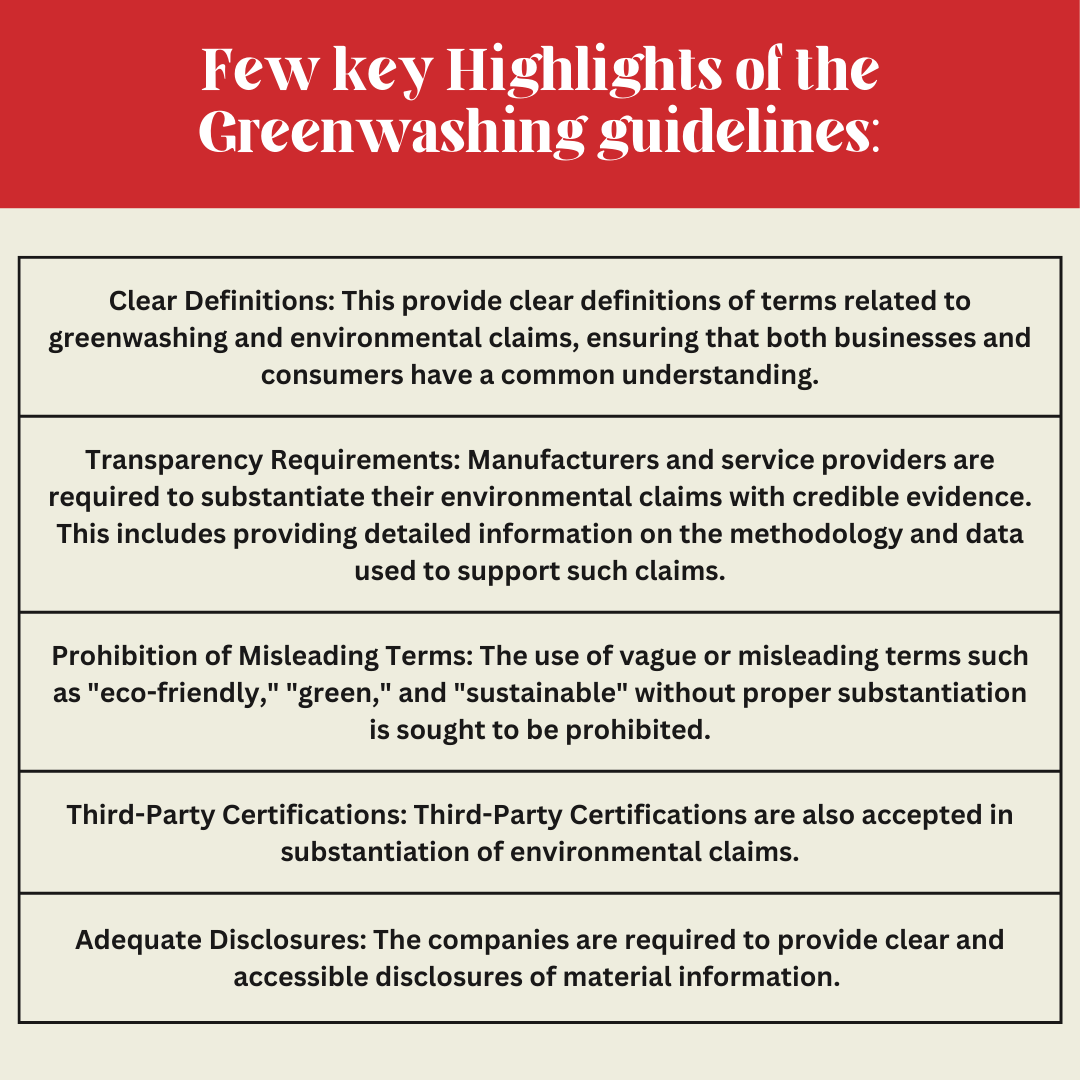On October 15, The Central Consumer Protection Authority (CCPA) has issued guidelines for prevention and regulation of greenwashing and misleading environmental claims to address the issue of greenwashing and misleading environmental claims for regulating matters related to misleading advertisements which is prejudicial to the interest of public and consumers.

“Greenwashing” is a term that plays on the word “whitewashing” and refers to the marketing tactic where companies falsely claim or exaggerate the environmental benefits of their products or services, often using vague or unsubstantiated terms such as “natural,” “eco-friendly,” or “green.”
The objective of these guidelines is to enhance consumer trust and encouraging sustainable business practice for fostering truthful practices where environmental claims are both truthful and meaningful. “The guidelines are yet another step forward by the government to protect consumer interest. They explain what greenwashing means, as well as the do’s and don’ts with respect to it,” said Aarushi Jain, Partner (Head – Media, Education & Gaming), Cyril Amarchand Mangaldas.
What is interesting is that the guidelines discuss greenwashing by way of relatable illustrations. The guidance notes will help advertisers appreciate the contours of marketing claims, and consumers understand what is true and when they are misled.Aarushi Jain, Partner (Head – Media, Education & Gaming), Cyril Amarchand Mangaldas.
The guidelines are drafted in the wake of the rapid increase of advertisement of green (environmental friendly) products and the growing number of environmentally aware consumers. “The new set of Guidelines aim to bring clarity to the advertisement practices, as they mandate any environmental claims to be backed by verifiable evidence or certification issued by statutory authorities,” said Nikhil Varma, Managing Partner, MVAC Advocates & Consultants.
This is a positive and welcoming step by the Ministry of Consumer Affairs as they aim to strengthen and further protect consumers’ rights and interests from greenwashing advertisements that are prejudicial to the interests or rights of any consumer.Nikhil Varma, Managing Partner, MVAC Advocates & Consultants
Greenwashing creates an illusion of environmental responsibility, many unscrupulous companies end up exploiting consumers’ growing environmental sensitivity. This deceptive practice not only misleads well-intentioned consumers but also diverts attention from broader environmental efforts. Thus, “The Greenwashing guidelines are a welcome step in keeping a check on modern day advertisements regarding eco-friendly/organic products. The definitions contained in the guidelines are wide and expansive enough to include a wide variety of goods and services,” said Rohan Taneja, Senior Associate, Kred Jure.
The guidelines also further the intent behind creation of a Central Consumer Protection Authority which is tasked with preventing advertisers from releasing misleading advertisements and/or claims.Rohan Taneja, Senior Associate, Kred Jure
These guidelines are designed not to stifle companies’ environmental efforts of manufactures and service providers but to ensure that such claims are transparentand made with integrity. “It is also heartening to see how these guidelines use technological advancements for logistical ease of compliance by specifying that adequate disclosures can be made by inserting a QR Code or URL,” said Sohini Mandal, Founder, Nilaya Legal,
The guidance notes provided in the annexure to the guidelines will also help businesses to understand the legislative intent clearly, as it gives illustrations of what may amount to false advertisements, what are the scenarios where third-party certifications may be required, et. al.Sohini Mandal, Founder, Nilaya Legal
In January 2024, the EU approved a new greenwashing directive, imposing stricter rules to the use of environmental claims by companies. “Earlier this year, the European Parliament also made a public statement, announcing its ambition to update their current commercial practices and consumer protection laws to ban greenwashing altogether and update their product content disclosures to inform the citizens on product durability to further reduce waste generation,” said Aashwyn Singh, Associate, SKV Law Offices.
In light of these developments, similar initiatives in India will not only empower consumers but also encourage businesses to embrace authentic sustainable practices. By fostering an environment of transparency and accountability, India can collectively work towards a greener future.Aashwyn Singh, Associate, SKV Law Offices
Greenwashing leads to deceptive marketing strategy , misleading consumers and customers, “On many occasions, we have faced the same concern as the companies are unable to give any credible evidence. Regulators and guidelines do play a crucial role wherein the companies follow their environmental claim. This will protect the consumers and also encourage businesses to adopt more sustainable practices,” said Alay Razvi, Managing Partner, Accord Juris,
The key measures would be companies to provide accessible and verifiable evidence to support their environmental claims, penalties must be more severe for misleading claims and consumer rights and transparency.Alay Razvi, Managing Partner, Accord Juris
Due to the legislative gap, companies faced scrutiny and regulatory action for using greenwashing to advertise its products which were regulated collectively by the Consumer Protection Act, ASCI Guidelines, BIS, Ministry of Environment, Forest and Climate Change, etc. “With the increase in the practice of greenwashing by companies and increase to attract the consumers driven towards sustainability, the new guidelines are a significant and welcome move,” said Saurav Agrawal, Advocate, Delhi High Court
They will ensure that companies back their environment claims with credible evidence so that consumers can make informed choices. These guidelines will promote an honest marketplace and will result in genuine sustainability initiatives by companies.Saurav Agrawal, Advocate, Delhi High Court
The Section 5 of the guideline deals with substantiation and adequate disclosure clauses. “As per the Draft Guidelines, such substantiation has to also be necessarily made comprehendible to the end consumer. In case of non-adherence to the said guidelines, the penalty as provided in the Consumer Protection Act, 2019 will apply, entailing potential penalties including imprisonment for a term of up to six months, a fine of up to Rupees Twenty Lakhs, or both,” said Vipul Jai, Partner, PSL Advocates & Solicitors.
This regulatory shift is expected to bring much-needed transparency and discourage businesses from making vague or fraudulent environmental claims.Vipul Jai, Partner, PSL Advocates & Solicitors.
The guidelines provide clear definitions of terms related to greenwashing and environmental claims, ensuring that both businesses and consumers have a common understanding. Thus, “The guidelines have made clear that all such claims should be based on verifiable information and unambiguous terms like green or organic should not be used without proper data. no misleading images should be printed on products which creates false impression about the product,” said Tushar Agarwal, Founder & Managing Partner, C.L.A.P. JURIS, Advocates & Solicitors.
The guidelines are the strong step towards the consumer protection in the scenario where the market is flooded with FMCG products.Tushar Agarwal Founder & Managing Partner C.L.A.P. JURIS, Advocates & Solicitors
The companies are required to provide clear and accessible disclosures of material information. Claims must specify the aspect refer to (good, manufacturing process, packaging, etc.) and be supported by credible certification or reliable scientific evidence. “A key takeaway from these guidelines is that they require specific environmental claims to be supported by disclosure of credible certification and reliable scientific evidence,” said Kritika Seth, Founding Partner, The Victoriam Legalis (TVL).
By mandating that corporations authenticate their environmental claims, the guidelines aim to nurture a marketplace where such claims are both honest and meaningful, thereby enhancing consumer trust and encouraging sustainable business practices.Kritika Seth, Founding Partner, The Victoriam Legalis (TVL)
After adequate deliberations the committee submitted its recommendations. Based on the recommendations of the committee the Department placed the Draft Guidelines for Greenwashing for public comments on 20th February 2024.
The CCPA after considerations of the suggestions unveiled the guidelines titled “Guidelines for Prevention and Regulation of Greenwashing or Misleading Environmental Claims, 2024” to prevent greenwashing and misleading environmental claims, ensuring transparency and accuracy in advertisements related to environmental sustainability.


